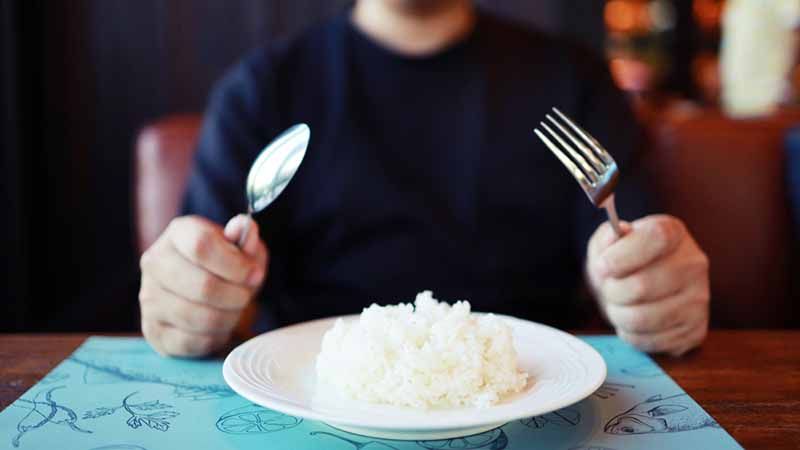Many people wonder if they can still enjoy rice while trying to lose weight. The good news is, yes, rice can be part of a healthy weight loss diet. It’s all about the type of rice you choose and how you include it in your meals. Brown rice, for example, is packed with fiber, which helps you feel full longer. This post will break down how to smartly incorporate rice into your diet, focusing on portion sizes and pairing it with the right foods. So, if you love rice and are looking to shed some pounds, you’re in the right place.

Contents
Is Rice Good for Weight Loss?
Yes, rice can be part of a weight loss diet if consumed in moderation and prepared healthily. Here are ten reasons why rice, particularly whole grain or brown rice, can be beneficial for those looking to lose weight:
1. Low in Fat:
Rice, especially brown rice, is low in fat. Incorporating low-fat foods into your diet can help reduce overall calorie intake, which is crucial for weight loss. Unlike processed foods high in unhealthy fats, rice provides a modest amount of calories without contributing to fat accumulation.
2. High in Fiber:
Brown rice is a good source of dietary fiber, which is essential for weight loss. Fiber helps in maintaining a feeling of fullness for longer periods, reducing the overall intake of food throughout the day. It also aids in digestion and helps in the efficient removal of waste, contributing to better gut health and weight management.
3. Whole Grain Option:
Whole grain varieties of rice, such as brown, black, or red rice, contain more nutrients compared to white rice. These nutrients, including B vitamins, magnesium, and iron, can help boost metabolism and improve overall health, making it easier to manage weight.
4. Provides Energy:
Rice is a carbohydrate-rich food that provides the body with energy. Having a controlled portion of rice can fuel your body for physical activities, which is vital for burning calories and losing weight.
5. Versatile and Satisfying:
Rice can be a versatile ingredient that fits well into various healthy dishes. It can be paired with vegetables, lean proteins, and healthy fats to create balanced meals that are satisfying and conducive to weight loss.

6. Low Sodium Content:
Rice naturally has low sodium content, making it a good choice for reducing water retention and bloating. Managing sodium intake is important for preventing weight gain due to water weight.
7. Gluten-Free:
For individuals with gluten intolerance or celiac disease, rice is an excellent gluten-free carbohydrate source. It allows for a varied diet without the digestive issues associated with gluten, which can sometimes contribute to weight gain or difficulty losing weight.
8. Helps in Portion Control:
The distinct serving size of rice can aid in portion control, which is a key factor in weight management. Measuring out servings of rice can help prevent overeating, making it easier to stick to a weight loss diet.
9. Contains Resistant Starch:
Cooked and then cooled rice increases in resistant starch, which acts similarly to fiber. Resistant starch promotes gut health, helps control blood sugar levels, and may aid in appetite control, all contributing to weight loss efforts.
10. Supports a Healthy Metabolism:
The magnesium and vitamins present in whole-grain rice can support a healthy metabolism, aiding the body’s ability to convert food into energy efficiently. A well-functioning metabolism is crucial for weight loss and maintaining a healthy weight.
Should I Avoid Rice To Reduce Belly Fat?
Avoiding rice entirely isn’t necessary to reduce belly fat, but moderation and choosing the right type of rice can make a difference. Here’s why:
1. Moderation is Key:
Rice, especially white rice, is high in carbohydrates and can contribute to calorie intake. Eating it in moderation is crucial, as consuming fewer calories than you burn is essential for losing fat.
2. Choose Whole Grains:
Opting for whole grains like brown, black, or red rice can be beneficial. These types of rice have more fiber, which can help you feel full longer and may aid in weight loss, including reducing belly fat. Fiber improves digestion and can help in managing blood sugar levels, reducing the likelihood of fat accumulation around the belly.
3. Balanced Diet Matters:
Incorporating rice into a balanced diet that includes a variety of nutrients is important. Pairing rice with lean proteins, healthy fats, and plenty of vegetables can enhance satiety and reduce the overall glycemic impact of the meal, aiding in belly fat reduction.

4. Portion Control:
Paying attention to portion sizes can prevent overeating. Using measuring cups or a digital scale to serve controlled portions of rice can help maintain a calorie deficit needed for weight loss.
5. Physical Activity:
Diet is just one part of the equation. Regular physical activity, including strength training and cardiovascular exercises, is essential for burning fat and building muscle, which can help slim the waistline.
6. Alternative Strategies:
For those looking to reduce carbohydrate intake, considering other whole grains or carb sources like quinoa, barley, or farro can provide variety and nutritional benefits.
Frequently Asked Questions
Why is rice good for weight loss?
Rice, especially brown rice, is high in fiber, which promotes feelings of fullness and helps control appetite. It is also low in fat and provides sustained energy, making it a valuable addition to a weight loss journey. Incorporating rice into your diet can support weight loss goals.
Is it okay to eat a lot of rice?
Excess consumption of rice, like any other simple carbohydrate, can lead to obesity. It is recommended to consume a reasonable amount, which is about 1-2 cups per day. Consuming 5-10 cups of rice a day is not recommended.
Can rice help reduce belly fat?
Refined carbs like bread, rice, and cookies can increase belly fat. To reduce belly fat, focus on eating nutrient- and fiber-rich carbs like vegetables and low-glycemic fruits. Rice can still be a part of a balanced diet, but portion control is important.

Hello, I’m Ravindra. Over the years, I’ve immersed myself deeply into the world of fitness and health, transforming both my body and mind. Writing has allowed me to share my journey, insights, and expertise with those just starting out and seasoned fitness enthusiasts alike. Beyond just routines and diets, I believe in inspiring others to adopt a holistic approach to well-being.
